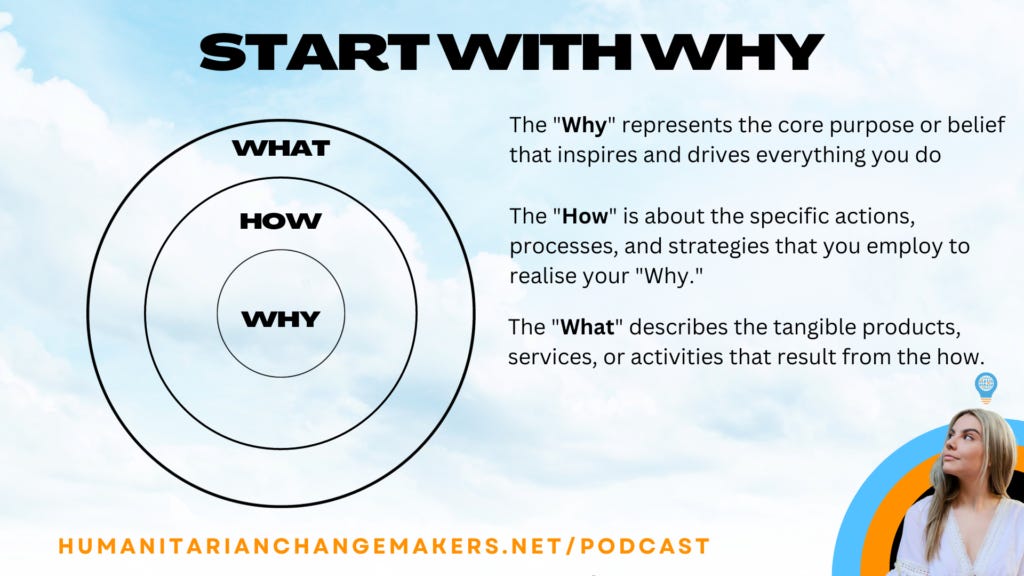Considering a PhD in the Social Change Space: What You Need to Know as a Changemaker
004. I'm thinking of doing a PhD, how do I know if it's right for me?
Deciding whether to pursue a Ph.D. is a significant life and career decision that demands careful consideration. If you’re contemplating a Ph.D. it’s crucial to weigh the various factors and determine if this path aligns with both your professional aspirations, and your mission as a changemaker.
Your Relationship With Your Work
Something I discuss in our social change handbook, The Changemaker In You, is the distinction between the different ways in which we might engage in our work as changemakers. This is inspired by Elizabeth Gilbert’s book, “Big Magic: Creative Living Beyond Fear,” which distinguishes four types of work: hobbies, jobs, careers, and vocations. These distinctions provide a helpful framework for assessing your relationship with your work and your potential for change:
Hobbies: Hobbies are activities pursued for enjoyment, relaxation, or creative expression. In the context of social change, hobbies can involve exploring interests, developing skills, or passions without expecting financial gain or formal recognition.
Jobs: Jobs are typically undertaken for financial compensation and serve as a means of earning a living. While they may not always align with one’s passions, they offer economic stability and support for basic living expenses.
Careers: Careers involve long-term commitments to a particular field or profession, often driven by personal ambition and a desire for financial success. Careers may or may not align with social change work, and financial rewards and professional recognition can be central goals.
Vocations: Vocations represent a higher calling or sense of purpose in one’s work, driven by passion and intrinsic motivation. Those who consider their work a vocation prioritize personal fulfillment, meaning, and making a positive impact in the world over financial gain.
Before deciding to pursue a Ph.D., it’s essential to reflect on the role it would play in your life and career. A Ph.D. rarely falls into the “hobbies” category as it is a demanding and high-stakes endeavour. It also does not really qualify as a “job” since Ph.D. stipends are often insufficient compensation for the effort involved. Therefore, a Ph.D. typically falls into one of two categories:
As a Career Move: If you view a Ph.D. as a stepping stone in your career, it can open up new job opportunities and provide specialised knowledge and research skills that enhance your career prospects.
As a Vocation: A Ph.D. as a vocation implies pursuing it for personal fulfilment and a deep sense of purpose, even if the expected career benefits are limited.
As a changemaker, the work you do to create change might not necessarily be aligned with your desire to pursue a Ph.D, especially if your career is unrelated to your impact work, so your decision will be based on whether or not it is the right career move for you. If the pursuit of a Ph.D is something you’re considering as part of your work as a changemaker, it might be a good idea to determine whether or not a higher research degree is the best vehicle to carry out your mission.
Is Research A Vehicle For Your Impact?
Simon Sinek’s “Start With Why” framework, consisting of three concentric circles—why, how, and what—can help you clarify your motivation for pursuing a Ph.D.
Why:
Definition: The “Why” represents the core purpose or belief that inspires and drives everything an individual or organisation does.
It is the foundation and the most critical element in the framework.
It’s about the higher purpose, the reason for existence, and the deep motivation.
It’s often expressed in terms of the impact or contribution to a larger cause or society.
Example: “To inspire and empower people to achieve their full potential, so they can lead more fulfilled lives.”
How:
Definition: The “How” is about the specific actions, processes, and strategies that an individual or organization employs to realise their “Why.”
It outlines the unique approaches, values, and principles that set an entity apart.
It details the strategies and methods used to achieve the “Why.”
It represents the guiding principles or values that inform decision-making and behavior.
Example: “We achieve our ‘Why’ by providing accessible education, fostering a growth mindset, and offering continuous support.”
What:
The “What” describes the tangible products, services, or activities that result from the “Why” and “How.”
It represents the visible output of an individual or organization’s efforts.
It includes the products, services, or actions that people can see, touch, or engage with.
It’s what an entity offers to the world based on their ‘How.’
Example: “We create user-friendly digital tools, conduct workshops, and provide resources to help individuals reach their full potential.”
First, identify your “why” by defining your purpose as a change maker and the impact you aim to achieve. Then, consider the “how” by assessing whether research in a particular academic field is one way to fulfil your “why.” If they align, the “what” might then involve undertaking a Ph.D. If research in a particular field doesn’t seem like it aligns with your ‘why’ as a changemaker, and it’s not really the right career move for you, then there are probably alternative pathways you should consider.
Listen to the full episode:
Life events, economic conditions, and personal commitments should all be considered before embarking on this journey. Finances play a critical role in the decision to pursue a Ph.D, as the stipends are generally modest and may not adequately cover living expenses, especially if you have dependents. For most people, it’s not a question of whether to pursue a Ph.D, but when. It’s essential to evaluate your financial situation and determine if you can manage a potentially significant pay cut. Weigh the financial aspects, timing, and the alignment of a Ph.D. with your overarching goals as a change maker. Ultimately, a Ph.D. can be a transformative and fulfilling journey if it aligns with your aspirations and circumstances.
Click here to read the episode transcript.





